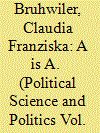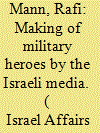|
|
|
Sort Order |
|
|
|
Items / Page
|
|
|
|
|
|
|
| Srl | Item |
| 1 |
ID:
131537


|
|
|
|
|
| Publication |
2014.
|
| Summary/Abstract |
In 1979, writer Tom DeFalco was paired with artist and cocreator of Spider-Man, Steve Ditko, to work on an issue of Machine Man, one of the many superheroes populating the universe of Marvel Comics. Instead of the usual introduction and business chatter, Ditko challenged DeFalco during a first conversation: "Are you Tom? What gives you the right to write about heroes?" (Tucker 2012). By the time of this exchange, Ditko had not only (co-) created and continued numerous superhero stories, ranging from Captain Atom to Dr. Strange or the Hulk, but he had also dedicated a lot of thought to the question as to what composed true heroism. In the 1960s, he had already found answers in a place not uncommon for that time, namely, in the novels of a Russian immigrant whose work should serve, in her own words, as "the projection of an ideal man".
|
|
|
|
|
|
|
|
|
|
|
|
|
|
|
|
| 2 |
ID:
106042


|
|
|
|
|
| Publication |
2011.
|
| Summary/Abstract |
American history textbooks for the USA's public schools act as quasi-official loci for the renegotiation of national identity and are, as such, subject to much controversy. The choice of heroes and the way in which textbooks depict them display the interplay between competing visions of popular ethno-history and scholarly historiography. This article examines contemporary renegotiation of the national narrative through an analysis of the evolving representation of the USA's two most prominent traditional national heroes - George Washington and Abraham Lincoln - in history textbooks for elementary-school students published from the early 1980s to 2003. This period marks the development of the multiculturalist movement and its subsequent conservative backlash, with debates intensifying in the wake of the events of 11 September 2001.
|
|
|
|
|
|
|
|
|
|
|
|
|
|
|
|
| 3 |
ID:
160944


|
|
|
|
|
| Summary/Abstract |
Is there a place for military heroes in a post-heroic era and during post-heroic warfare? This article, focusing on the role of the media, especially popular media, in the construction of military heroes and heroism in twenty-first century Israeli society, suggests that, at least within the media, such heroes still play an important role. Based on test cases, among them the 2010 Mavi Marmara affair, the article presents and analyses journalistic professional considerations and practices involving stories about military heroes and explains how items about heroes and heroines correspond with the various requirements of the media. The article also analyses the use of social media in the construction of a new type of ‘folk hero’, who is often a controversial and disputed kind of hero, such as in the case of the soldier who shot and killed a wounded Palestinian terrorist in Hebron.
|
|
|
|
|
|
|
|
|
|
|
|
|
|
|
|
| 4 |
ID:
180720


|
|
|
|
|
| Summary/Abstract |
I SPENT much of my childhood in Ukraine. The son of an army officer, I moved from garrison to garrison due to my father's promotions. Each time, I had to adjust to a new group of children, and that wasn't always a smooth process. It was one thing if you were put in, say, a fifth-grade class that consisted of boys and girls of the same age from the entire garrison. Everyone would be glad a new kid had joined the class and friendships were normally quick to develop. But what was happening outside school was a different story: kids of all ages would come together in outdoor spaces and form a group with its own established rules and leaders. That was a milieu you needed some effort to adjust to. You had to go through various trials to win the right to be accepted by the gang as one of their own. But if you were accepted as such, you were one hundred percent safe. The gang would never have betrayed you and would always have protected and taken care of you.
|
|
|
|
|
|
|
|
|
|
|
|
|
|
|
|
|
|
|
|
|